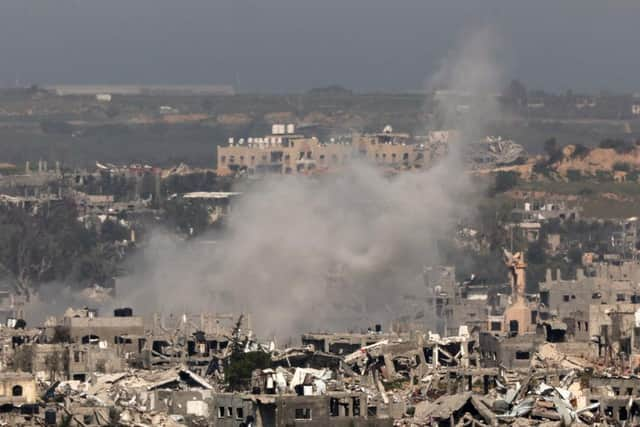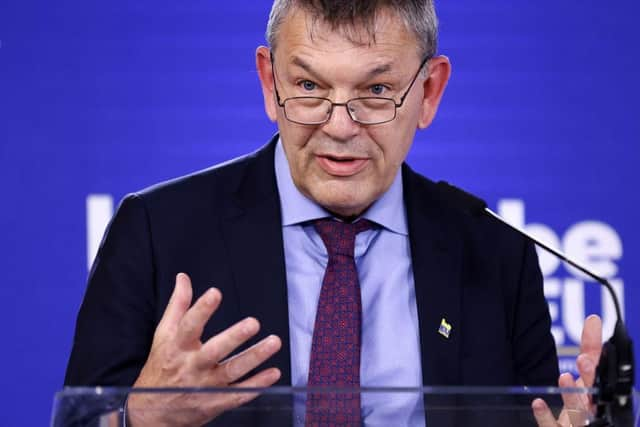Isreal-Gaza: UNRWA, the largest Gaza aid agency 'hanging in the balance' after funding cuts as conflict hits five-month mark
When Philippe Lazzarini spoke at the United Nations’ General Assembly this week, his message was clear.
The head of accusation-hit Palestinian refugee aid agency UNWRA warned delegates the fate of the organisation – and the millions of people in Gaza who depend on it for essential aid – are “hang[ing] in the balance” after governments withdrew funding following claims members of its staff were involved in the October 7 attacks in Israel.
Advertisement
Hide AdAdvertisement
Hide AdIf something does not change, he warned, UNWRA, which is by far the biggest aid organisation in Gaza, could collapse.


A total of 16 countries, including the US and the UK, paused funding for the organisation worth $450 million [£351m], bringing to an abrupt halt the distribution of aid into Gaza, where 80 per cent of the population have been displaced from their homes due to the conflict.
The US has begun air drops of food aid into the strip. However, officials have warned it is an expensive and insufficient alternative to aid brought in by land – and will reach only a small proportion of the population.
Humanitarian organisations have described children, including newborn babies, starving to death and families forced to eat grass in an attempt to survive. Meanwhile, a lack of medical supplies has meant doctors have had to amputate limbs and perform Caesarean sections without anaesthesia.
“UNRWA has no capacity to absorb financial shocks, especially while a war rages in Gaza,” Mr Lazzarini said, warning that without additional funding, UNRWA would be in “unchartered territory, with serious implications for global peace and security”.


Israel claimed in January that 12 of UNRWA’s 13,000 staff in Gaza had been involved in Hamas attacks, which saw 1,000 people killed and hundreds of hostages taken. An independent internal UN investigation was launched and the staff fired from their jobs.
However, Mr Lazzarini said UNWRA, which was was set up 74 years ago to provide relief to all refugees resulting from the 1948 Palestine War, is facing a “deliberate and concerted campaign to undermine its operations, and ultimately end them”.
He warned of serious consequences, not only for the millions of Gazans living in dire conditions, but for future peace in the Middle East.
Advertisement
Hide AdAdvertisement
Hide Ad"Dismantling UNRWA is short sighted,” he said. “By doing so, we will sacrifice an entire generation of children, sowing the seeds of hatred, resentment and future conflict."
The organisation said just 98 trucks of aid per day are entering Gaza – half the amount seen in January, before international funding was withdrawn. Before the existing crisis, hundreds crossed the border on a daily basis. However, many which attempt to cross are blocked by the Israeli military.
Ziad Issa, head of humanitarian policy at ActionAid, said UNWRA was fundamental to other aid agencies being able to operate in Gaza.
"In this particular crisis, UNWRA has been fundamental for many organisations, because we rely on them in access to the aid that is going through Rafah [Gaza’s border with Egypt],” he said.
"A lot of organisations worked with UNWRA on using their trucks and warehouses, as they do have these resources because this is what they've been doing for years since the problems in Gaza started. They have been fundamental in allowing organisations to access the aid that is getting through.
"There is no alternative for UNWRA in this current crisis. Who is going to pick up the work that UNWRA is doing in a crisis where access is very limited? It's a main humanitarian agency in Gaza. If it suspends its operation, we just can't do anything."
Mr Issa pointed to UNWRA's mandate to help not only Palestinians in Gaza, but those living in other countries such as Lebanon and Syria.
"The funding cuts doesn't only impact those in Gaza, but also will have huge implications in the region and that is going to affect regional stability,” he said.
Advertisement
Hide AdAdvertisement
Hide AdSome countries have said they would reinstate funding to UNWRA, which provided aid to 80 per cent of Gazans before October. The European Commission said last week it had reassessed the situation and it would start to distribute €50 million [£43m] out of the €82m [£70m] allocated for UNRWA for 2024. Canada said on Wednesday it would also resume funding, beginning with a scheduled payment in April of $25m [£14m]. However, the US, historically one of the largest financial contributors to UNRWA, has not yet done so, nor has the UK.
Even if more funding is restored, it will be too late for many people in Gaza.
Humanitarian organisation Care said 2.3 million Palestinians were under “imminent threat of starvation”. One hospital has already reported the deaths of 15 children due to starvation, but the numbers across Gaza are expected to be far higher. In the north of Gaza, where aid trucks have struggled for access due to the intensity of the conflict, one in six children under two years of age is believed to be acutely malnourished.
The charity’s West Bank and Gaza country director, Hiba Tibi, said some children had stopped speaking due to the trauma of what they had seen. Meanwhile, doctors have warned that a sharp increase in malnutrition has led to an increase in death among children and cases of stillborn babies.
“This is a crisis unlike anything we have ever seen before,” said Ms Tibi. “Aid is still not getting in, and our humanitarian aid workers are risking their lives doing their jobs. Yet, the military blockade continues, impeding people’s ability to access food, cutting off humanitarian corridors that should serve as a lifeline for people in desperate need.”
Comments
Want to join the conversation? Please or to comment on this article.
